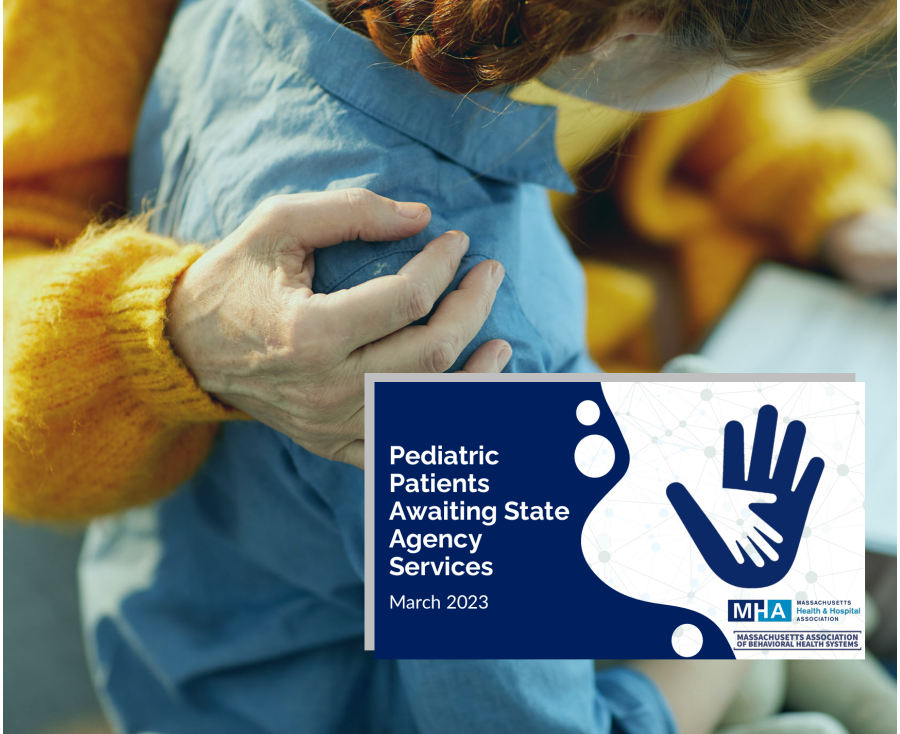Pediatric Patients Awaiting State Agency Services

A new survey from MHA and the Massachusetts Association for Behavioral Health Systems (MABHS) shows that throughout the year at Massachusetts hospitals, dozens of “state-agency-involved” children are ready to be discharged but are “stuck” in the hospitals because they cannot access the next level of care they require.
View the Report:
State-agency-involved patients are those whose case management requires the participation of a state agency and/or access to state agency services, such as those provided by the Department of Children and Families (DCF), Department of Mental Health, Department of Developmental Services, and Department of Youth Services.
The most recent survey results, from December 2022, of 29 hospitals and five freestanding psychiatric facilities showed there were 69 such stuck patients. Patients who are typically referred to as stuck are those facing barriers in transferring out of a hospital’s inpatient or emergency department setting. That is, these pediatric patients need care provided in the community, such as residential settings or group homes. Such patients typically present with conditions that are medically or behaviorally complex. Pediatric patients with diabetes as one of their conditions pose a particular challenge, according to the MHA survey. Of the 69 stuck patients in December, 57 were involved with DCF. In addition to the 69 stuck patients who were involved with state agencies, there were an additional 50 stuck pediatric patients who were awaiting residential education through local education agencies.
These agency-involved patients awaiting discharge to another setting are distinct from pediatric patients who are “boarding” in hospitals as they await an inpatient bed. MHA’s survey of boarding pediatric patients (see story at bottom of page) shows there are regularly from 90 to 150 children waiting for an inpatient bed.
“As MHA continues its work to highlight the causes of capacity and access challenges now being seen around the state, this was a critical population to take into account,” said Leigh Simons Youmans, MHA’s senior director of Healthcare Policy. “We hope this new data can help steer the long-term solutions that providers, state leaders, and our partners throughout the mental health space are now exploring.”
Survey comments on the challenges to discharging stuck children emphasized the “lack of appropriate placements for children with both behavioral and medical needs” and “not enough beds” for children and families seeking state agency services.
Recommendations made in the report include provisions of MHA-supported legislation, bill, An Act to Ensure Access to Behavioral Health Services for Children Involved with State Agencies, HD3059 and SD965, filed by Representative Marjorie Decker (D-Cambridge) and Senator Brendan Crighton (D-Lynn), respectively. These provisions include centralizing the DCF process to escalate cases and conducting a study to determine system needs, including alternative models for children with complex and/or chronic medical and psychiatric needs, among other provisions that build off of legislation passed last year, The Mental Health ABC Act. Additionally, this issue would be aided through Governor Healey’s budget proposal to increase DCF’s funding by $52.5 million to support congregate care providers to increase capacity to the levels needed to serve children involved with DCF.
Placement challenges that delay the discharge of patients from hospitals exacerbate the pediatric behavioral health crisis across the continuum. The survey showed that state-agency involved pediatric patients were disproportionately stuck in an ED (49%) or an inpatient psychiatric unit (37%). The longest wait times for stuck pediatric patients were between 61 and 100 days, with more than half of patients waiting over 10 days. While these children wait to be discharged, they occupy inpatient psychiatric beds that other children are waiting for as they board in EDs and on medical/surgical floors.

 Massachusetts Health & Hospital Association
Massachusetts Health & Hospital Association